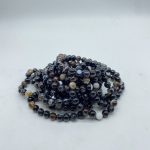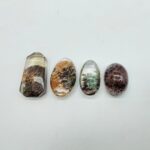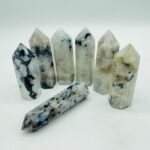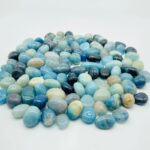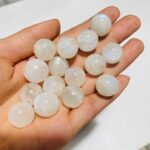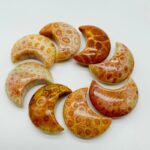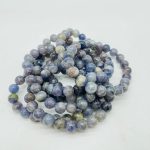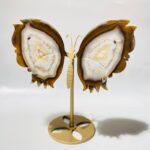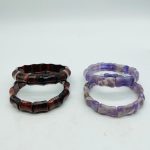Introduction
Flowering agate, a captivating gemstone, has mesmerized collectors and artisans for centuries. Its unique dendritic formations, resembling intricate blooming flowers, evoke a sense of wonder and inspiration.
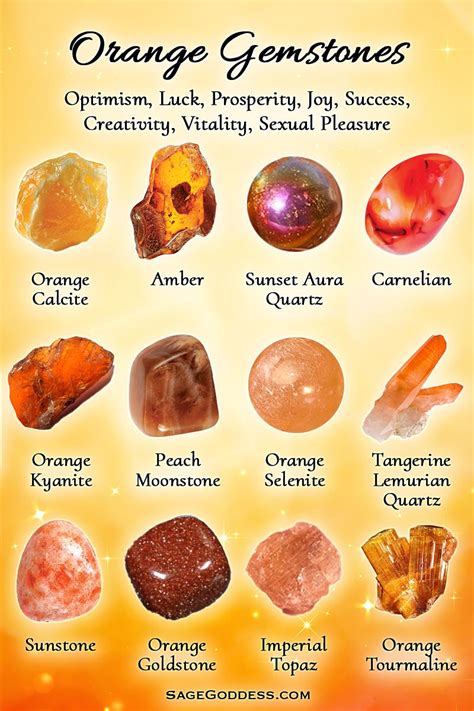
Geological Formation
Flowering agate is formed when layers of silica-rich water seep into cracks and cavities within volcanic rocks. Over time, minerals such as iron oxides, manganese, and copper crystallize and branch out, creating the characteristic flower-like patterns.
Origin and Distribution
Flowering agate is primarily found in Brazil, specifically the states of Rio Grande do Sul and Paraná. It is also found in some parts of the United States, Mexico, and Madagascar.
Physical Properties
- Hardness: 6.5-7 Mohs scale
- Density: 2.58-2.69 g/cm³
- Color: Pink, purple, blue, green, yellow, red
- Transparency: Translucent to opaque
- Luster: Vitreous
Metaphysical Beliefs
In various cultures, flowering agate is revered for its metaphysical properties. It is believed to:
- Promote emotional healing and inner peace
- Enhance creativity and self-expression
- Protect against negative energies
- Strengthen relationships and attract love
Applications
- Jewelry: Flowering agate is a sought-after gemstone for jewelry pieces such as necklaces, bracelets, earrings, and pendants.
- Art and Decor: Its mesmerizing patterns make it an excellent embellishment for vases, sculptures, and home accessories.
- Crystals for Healing: Practitioners of crystal healing use flowering agate to balance emotions and promote well-being.
- Feng Shui: In Feng Shui, flowering agate is associated with the element of water and is believed to bring harmony and abundance.
- Fashion Photography: Flower agate backdrops have gained popularity in fashion photography, adding a touch of natural beauty to editorials and advertisements.
Comparisons to Other Agates:
| Feature | Flowering Agate | Common Agate | Lace Agate |
|---|---|---|---|
| Color | Vibrant, flower-like patterns | Solid or banded colors | Delicate, lace-like patterns |
| Formation | Dendritic crystal growth | Interlocking silica layers | Intertwined chalcedony fibers |
| Luster | Vitreous | Vitreous | Vitreous |
| Origin | Brazil, Mexico | Worldwide | Madagascar |
| Applications | Jewelry, art, healing | Jewelry, countertops, flooring | Jewelry, gemstones |
Market Insights
The market for flowering agate is growing rapidly, driven by increased demand for unique and natural gemstones. As of 2023, the global market size is estimated at $2 billion and is projected to reach $3 billion by 2025.
The growing interest in crystal healing, Feng Shui, and natural home decor has further fueled the demand for flowering agate products.
Innovations in the Industry
- Biomimicry: Designers are incorporating flowering agate into products that mimic natural forms, such as organic jewelry pieces and abstract sculptures.
- XR and VR: Extended reality technologies are being used to create immersive experiences that showcase the beauty and diversity of flowering agate.
- 3D Printing: 3D printing allows for the creation of complex and intricate flowering agate designs in jewelry and other applications.
Future Prospects
Flowering agate continues to be a sought-after gemstone with immense potential for growth and innovation. As the global economy recovers, we anticipate continued expansion in the market for this captivating material.
The gemstone’s versatility and appeal make it well-positioned to endure in various industries, including jewelry, art, healing, and fashion.
Conclusion
Flowering agate is a captivating gemstone that continues to inspire and captivate. Its unique geological formation, metaphysical beliefs, and diverse applications make it a valuable and timeless addition to any collection or decor.
As the market for flowering agate continues to grow in the coming years, it is essential to embrace innovation and explore new ways to showcase the beauty and significance of this remarkable natural treasure.











